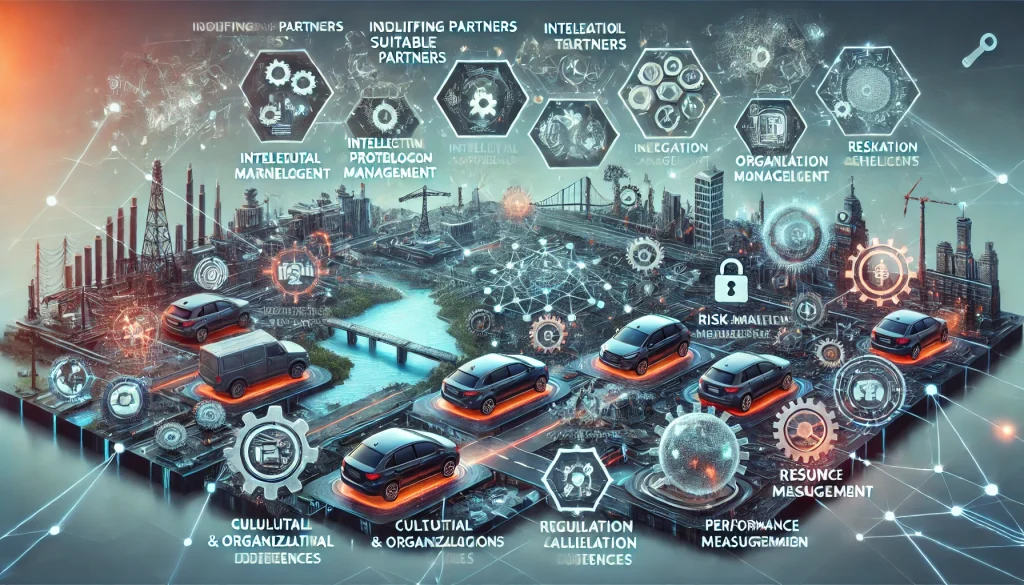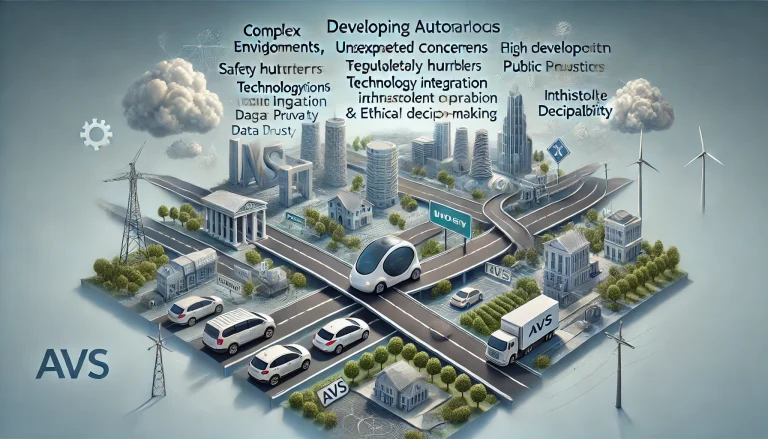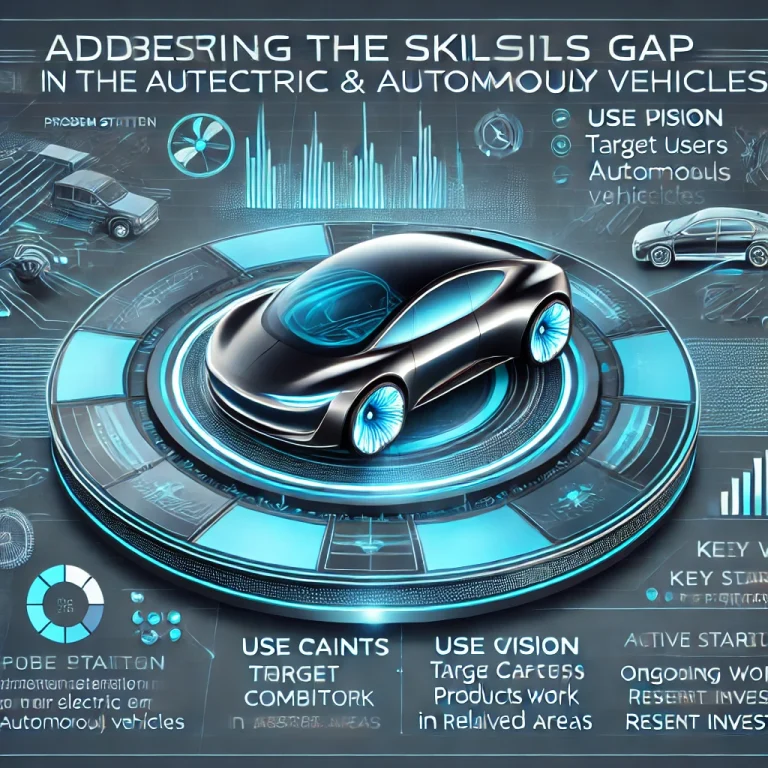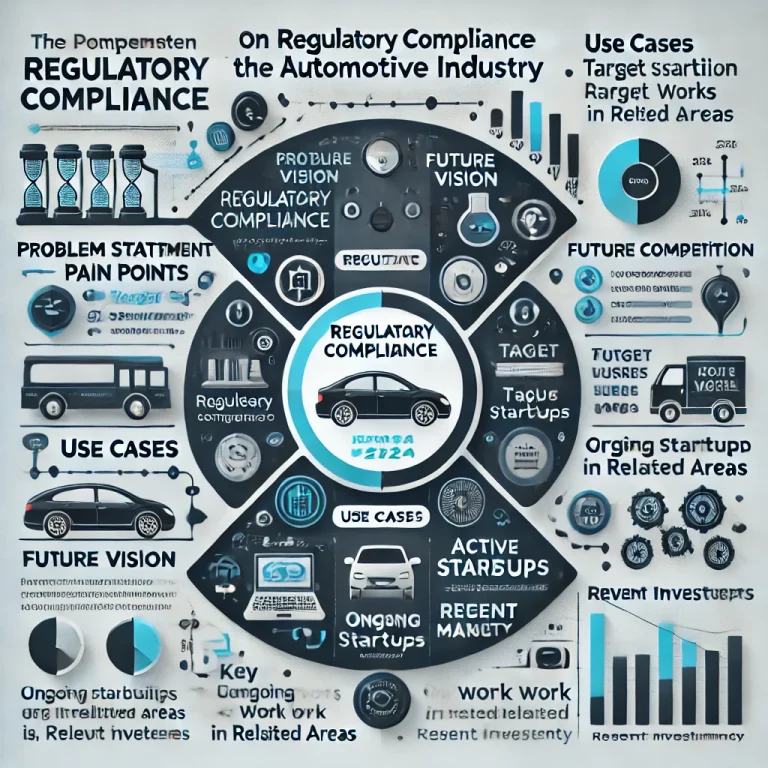Problem Statement
The rapid advancement and increasing complexity of modern automotive technology have necessitated a shift in how automotive companies approach innovation and competitiveness. Traditional automotive manufacturers are facing unprecedented challenges in developing and integrating cutting-edge technologies such as autonomous driving, electrification, and connected vehicle services. These technologies require expertise beyond the traditional scope of automotive engineering, encompassing areas like software development, artificial intelligence, cybersecurity, and data analytics.
To effectively navigate this complex landscape, automotive companies are forming strategic partnerships and collaborative ecosystems with tech firms, startups, and other industry players. These collaborations enable companies to pool resources, share knowledge, accelerate innovation, and reduce time-to-market for new technologies. By leveraging the specialized expertise of partners, automotive manufacturers can overcome technical hurdles, meet evolving consumer demands, and stay ahead of emerging competitors.
However, building and managing these partnerships come with their own set of challenges. Companies must navigate issues related to intellectual property rights, cultural differences, integration of diverse technologies, and aligning strategic objectives. Ensuring effective communication, mutual trust, and clearly defined roles are critical for the success of these collaborations. Additionally, companies must be adept at identifying and engaging with the right partners that complement their strengths and address their weaknesses.
In summary, strategic partnerships and collaborative ecosystems have become essential strategies for automotive companies aiming to innovate and remain competitive in a rapidly evolving industry. Successfully leveraging these collaborations requires careful planning, effective management, and a clear understanding of mutual goals and benefits.
Pain Points
- Identifying Suitable Partners: Difficulty in finding and selecting partners with the right expertise, resources, and cultural fit to meet specific innovation goals.
- Intellectual Property (IP) Management: Challenges in defining and protecting IP rights within partnerships, ensuring fair sharing and avoiding potential disputes.
- Integration of Diverse Technologies: Complexities involved in seamlessly integrating technologies and systems from different partners into cohesive solutions.
- Cultural and Organizational Differences: Navigating varying corporate cultures, management styles, and operational processes between partnering organizations.
- Alignment of Strategic Objectives: Ensuring all partners have aligned goals and expectations to foster effective collaboration and mutual benefit.
- Communication and Collaboration: Maintaining clear and efficient communication channels among diverse teams across different organizations and geographies.
- Regulatory and Compliance Issues: Managing and adhering to various legal and regulatory requirements across different regions and industries involved in the partnerships.
- Resource Allocation and Management: Effectively distributing and managing shared resources, including finances, personnel, and infrastructure, among partners.
- Risk Sharing and Management: Defining and mitigating risks associated with collaborative projects, including technical failures, market uncertainties, and partnership dissolution.
- Performance Measurement and Evaluation: Establishing appropriate metrics and evaluation processes to assess the effectiveness and outcomes of partnerships.

Future Vision
Our platform envisions an automotive industry where strategic partnerships and collaborative ecosystems are seamlessly integrated into the core business strategies of companies, driving unprecedented levels of innovation, efficiency, and competitiveness. This future landscape is characterized by:
- Dynamic Partner Networks: Establishing flexible and scalable networks of partners, including tech firms, startups, suppliers, academic institutions, and government bodies, fostering continuous innovation and adaptation to market changes.
- Robust Collaboration Frameworks: Developing standardized frameworks and best practices for collaboration that address IP management, resource sharing, communication protocols, and conflict resolution, ensuring smooth and effective partnerships.
- Integrated Technology Platforms: Creating unified technology platforms that enable easy integration and interoperability of diverse systems and solutions contributed by various partners.
- Data-Driven Decision Making: Leveraging advanced analytics and AI to identify optimal partnership opportunities, predict market trends, and drive strategic planning and execution.
- Innovation Hubs and Incubators: Establishing dedicated spaces and programs that facilitate co-creation, experimentation, and rapid prototyping among partners, accelerating the development and deployment of new technologies.
- Enhanced Regulatory Collaboration: Engaging proactively with regulatory bodies to shape conducive policies and standards that support collaborative innovation while ensuring safety and compliance.
- Sustainable and Ethical Practices: Ensuring that collaborative efforts prioritize sustainability and ethical considerations, addressing environmental impacts, and promoting social responsibility across the automotive ecosystem.
- Continuous Learning and Development: Fostering a culture of continuous learning through shared knowledge resources, training programs, and collaborative research initiatives among partners.
- Customer-Centric Innovations: Aligning partnership objectives closely with evolving customer needs and preferences, delivering personalized and high-value experiences through collaborative innovation.
- Resilient and Agile Operations: Building operational structures that can quickly adapt to disruptions and leverage collaborative networks to maintain continuity and drive growth.
By realizing this vision, the automotive industry can effectively address the complexities of modern technology, accelerate the pace of innovation, and deliver superior products and services that meet the demands of a rapidly changing market.
Use Cases
- Joint Development of Autonomous Driving Systems: Automotive manufacturers partnering with tech companies specializing in AI and machine learning to co-develop advanced autonomous driving solutions, sharing expertise and resources to accelerate development and deployment.
- Collaborative Electrification Projects: Traditional automakers collaborating with battery technology startups to innovate in electric vehicle (EV) battery performance, cost-efficiency, and sustainability, resulting in more competitive and environmentally friendly EV offerings.
- Connected Vehicle Services Integration: Partnerships between automotive companies and telecommunications firms to develop and implement high-speed, reliable connectivity solutions, enabling advanced in-car services such as real-time traffic updates, infotainment, and remote diagnostics.
- Shared Mobility Platforms: Collaboration between car manufacturers and ride-sharing startups to create integrated mobility solutions, offering consumers flexible and convenient transportation options while optimizing vehicle utilization.
- Cybersecurity Enhancements: Automotive firms working with cybersecurity experts to identify and mitigate potential vulnerabilities in connected and autonomous vehicles, ensuring data security and passenger safety.
- Sustainable Manufacturing Initiatives: Joint efforts between automakers and environmental technology companies to develop and implement sustainable manufacturing processes, reducing carbon footprint and promoting eco-friendly practices.
- Smart Infrastructure Development: Collaboration between automotive companies, urban planners, and government agencies to build smart infrastructure that supports autonomous and connected vehicles, including intelligent traffic systems and charging networks.
- Augmented Reality (AR) in Vehicles: Partnerships between car manufacturers and AR technology firms to integrate immersive AR experiences into vehicle interfaces, enhancing navigation, safety, and entertainment features.
- Predictive Maintenance Solutions: Joint development of predictive analytics tools between automakers and data analytics companies, enabling proactive vehicle maintenance and improving reliability and customer satisfaction.
- Innovative Financing Models: Collaboration between automotive firms and financial institutions to create new financing and insurance models tailored for advanced vehicle technologies, making cutting-edge vehicles more accessible to consumers.
Target Users and Stakeholders
- Automotive Manufacturers: Seeking to innovate and stay competitive by leveraging external expertise and resources through strategic partnerships.
- Technology Companies: Offering specialized skills and solutions in areas such as AI, software development, and connectivity, looking to expand their market presence in the automotive sector.
- Startups: Bringing innovative and disruptive technologies to the automotive industry, seeking collaboration opportunities for scaling and commercialization.
- Suppliers and OEMs: Collaborating to integrate advanced components and systems into vehicles, ensuring quality and efficiency.
- Government and Regulatory Bodies: Facilitating and overseeing collaborations to ensure compliance with regulations and promote industry growth and innovation.
- Academic and Research Institutions: Partnering with industry players to conduct research and development in advanced automotive technologies.
- Consumers: Benefiting from enhanced vehicle technologies and services resulting from successful collaborations.
- Investors and Venture Capital Firms: Funding collaborative projects and startups that demonstrate strong innovation potential and market viability.
- Industry Associations and Consortia: Supporting and promoting collaborative efforts across the automotive ecosystem through standardization, networking, and resource sharing.
Key Competitors
- Toyota: Actively engaging in partnerships with tech companies like Uber and SoftBank to develop autonomous driving and mobility services.
- Volkswagen Group: Collaborating with firms such as Microsoft for cloud services and Ford for electric and autonomous vehicle development.
- General Motors (GM): Partnered with companies like Cruise Automation and LG Chem to advance autonomous driving technologies and battery systems.
- Ford Motor Company: Collaborating with Argo AI for autonomous vehicle development and with various startups for connectivity and mobility solutions.
- BMW Group: Engaging in joint ventures with companies like Intel and Mobileye to develop autonomous driving platforms.
- Daimler AG (Mercedes-Benz): Partnering with Bosch for autonomous vehicle technology and with NVIDIA for AI-powered vehicle systems.
- Hyundai Motor Group: Collaborating with companies like Aptiv to form Motional, focusing on autonomous driving technology.
- Tesla: Although known for in-house development, Tesla engages in strategic partnerships for battery technology and energy solutions, such as with Panasonic.
- Honda: Partnering with GM and Cruise for autonomous vehicle development and with Hitachi for electric motor production.
- Renault-Nissan-Mitsubishi Alliance: A long-standing collaboration focusing on sharing technology and resources across electric and autonomous vehicle development.
Active Startups
- Aurora Innovation: Collaborating with multiple automakers to develop self-driving technology platforms.
- Rivian: Partnered with Amazon and Ford to develop electric vehicles and related technologies.
- ChargePoint: Working with automotive companies to expand electric vehicle charging infrastructure.
- Waymo: Engaging in partnerships with various car manufacturers to integrate its autonomous driving technology.
- NIO: Collaborating with tech firms for developing connected and intelligent electric vehicles.
- Proterra: Partnering with cities and transportation agencies to deploy electric bus and charging solutions.
- Wejo: Collaborating with automakers to leverage connected vehicle data for various applications.
- Zoox: Acquired by Amazon, working on autonomous mobility solutions and partnering with suppliers and tech firms.
- Upstream Security: Partnering with automotive companies to provide cybersecurity solutions for connected vehicles.
- Volta Charging: Working with retailers and property owners to expand public EV charging networks through strategic partnerships.
Ongoing Work in Related Areas
- Standardization Efforts: Developing industry-wide standards for autonomous driving technologies through consortia like SAE International.
- 5G Connectivity Trials: Collaborative projects between automakers and telecom companies to test and deploy 5G networks for connected vehicles.
- Smart City Initiatives: Joint efforts between automotive firms, tech companies, and municipalities to create urban environments supportive of advanced mobility solutions.
- Battery Technology Research: Collaborative R&D projects focusing on next-generation battery technologies for improved EV performance and sustainability.
- Artificial Intelligence Development: Partnerships aimed at advancing AI capabilities for vehicle perception, decision-making, and driver assistance systems.
- Shared Mobility Services: Collaborative platforms providing car-sharing, ride-hailing, and other mobility-as-a-service (MaaS) solutions.
- Cybersecurity Frameworks: Joint initiatives to establish robust cybersecurity measures and protocols for connected and autonomous vehicles.
- Environmental Sustainability Programs: Partnerships focusing on reducing the environmental impact of vehicle production and operation through green technologies.
- Human-Machine Interface (HMI) Innovations: Collaborative development of intuitive and user-friendly interfaces between drivers/passengers and vehicle systems.
- Data Sharing Agreements: Establishing frameworks for sharing and utilizing vehicle and user data across partners while ensuring privacy and compliance.
Recent Investments
- Volkswagen and Ford Partnership: In 2019, Volkswagen invested $2.6 billion in Ford’s autonomous vehicle partner Argo AI to collaborate on autonomous driving technology.
- Toyota’s Investment in Uber’s Self-Driving Unit: In 2018, Toyota invested $500 million in Uber’s autonomous driving division to co-develop self-driving cars.
- Hyundai and Aptiv Joint Venture: In 2019, Hyundai Motor Group and Aptiv formed a $4 billion joint venture to develop autonomous driving technologies.
- GM’s Investment in Cruise: Since acquiring Cruise Automation in 2016 for $1 billion, GM has attracted additional investments from SoftBank ($2.25 billion) and Honda ($2.75 billion) into Cruise.
- BMW and Daimler Mobility Services Merger: In 2019, BMW and Daimler invested over €1 billion to merge their mobility services, including car-sharing and ride-hailing platforms.
- Amazon’s Investment in Rivian: In 2019, Amazon led a $700 million investment round in Rivian to support the development of electric delivery vans.
- Microsoft and Volkswagen Cloud Partnership: In 2018, Volkswagen announced a partnership with Microsoft to develop the Volkswagen Automotive Cloud, investing significant resources into connected vehicle services.
- Bosch and Daimler’s Autonomous Parking Project: Ongoing investments into developing automated valet parking solutions, with successful trials conducted in 2019.
- Toyota’s Funding of Pony.ai: In 2020, Toyota invested $400 million in autonomous driving startup Pony.ai to accelerate self-driving vehicle development.
- Ford and Google’s Strategic Partnership: In 2021, Ford entered a six-year partnership with Google, leveraging Google’s AI, data analytics, and cloud services to enhance connected vehicle experiences.
Market Maturity
The market for strategic partnerships and collaborative ecosystems in the automotive industry is rapidly maturing as companies recognize collaboration as a critical driver of innovation and competitiveness. Established automakers are increasingly engaging with tech giants, startups, and other industry players to co-develop technologies and services that meet the evolving demands of consumers and regulatory environments.
Significant investments and successful collaborations have led to notable advancements in autonomous driving capabilities, electric vehicle performance, and connected services, demonstrating the effectiveness of these partnerships. The emergence of standardized frameworks and best practices for collaboration has further facilitated efficient and productive partnerships.
However, the market continues to face challenges related to coordination among diverse partners, integration complexities, and regulatory uncertainties. As the industry progresses, there is a growing emphasis on developing more robust and flexible collaboration models that can adapt to rapid technological changes and market dynamics.
The continued success and expansion of collaborative efforts are expected to drive substantial growth and transformation in the automotive sector, leading to more advanced, efficient, and user-centric mobility solutions.
Summary
The increasing complexity of modern automotive technology has made strategic partnerships and collaborative ecosystems essential for innovation and competitiveness in the industry. Automotive companies are partnering with tech firms, startups, and other stakeholders to advance in critical areas such as autonomous driving, electrification, and connected vehicle services. These collaborations enable sharing of expertise, resources, and risk, accelerating development and market entry of advanced technologies.
Despite the benefits, companies face challenges in identifying suitable partners, managing intellectual property, integrating diverse technologies, and aligning strategic objectives. Effective communication, robust collaboration frameworks, and proactive risk management are vital for overcoming these pain points.
The future vision encompasses dynamic partner networks, integrated technology platforms, data-driven decision-making, and sustainable practices, all contributing to a more innovative and resilient automotive industry. Numerous use cases and recent investments illustrate the tangible impacts and potential of these collaborations.
As the market matures, continued emphasis on effective partnership strategies will be crucial for automotive companies to navigate technological complexities, meet consumer expectations, and maintain a competitive edge in a rapidly evolving landscape.



